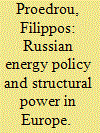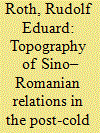|
|
|
Sort Order |
|
|
|
Items / Page
|
|
|
|
|
|
|
| Srl | Item |
| 1 |
ID:
158047


|
|
|
|
|
| Summary/Abstract |
This article focuses on post-2000 Russian education reforms, specifically the eradication of regional components from the school curriculum (in 2007) and the introduction of the Unified State Examination (in 2009), as part of a wider shift towards centralisation in Russian education. Based on ethnographic fieldwork in a semi-urban community in the Republic of Tatarstan over the period 2009–2013, the article examines what impact these reforms had on local practices of schooling, on the educational strategies of the population, and on minority language education more widely. It reveals that, while the new institutional framework imposed by the reforms limited the exposure of pupils to regional and ethno-cultural identity narratives, local educators managed to use the limited possibilities within the schools to promote ethnic and regional belonging.
|
|
|
|
|
|
|
|
|
|
|
|
|
|
|
|
| 2 |
ID:
158050


|
|
|
|
|
| Summary/Abstract |
Deploying the perspectives of diaspora politics and transnational social movements, this article analyses the impact of the key factors conditioning the overall environment in which the overseas Chinese democracy movement (OCDM) has operated since the 1989 Tiananmen event in Beijing (where weeks of mass protest rallies by students, intellectuals, workers, and citizens led to a violent crackdown by the People’s Liberation Army on the demonstrators on 4 June). China’s phenomenal rise as a global power, its transformed relations with the West and diaspora communities, and its toughening control over political dissent inside and outside the country have created an increasingly arduous and complex mobilising terrain for the dissidents in exile. Meanwhile, Taiwan’s democratisation, political nativisation, and China-focused economic exchanges have minimised Taipei’s role as the mainland exiles’ traditional backer. Finally, the shifting norms, demographics, and practices of the overseas Chinese diasporas have further compounded these challenges.
|
|
|
|
|
|
|
|
|
|
|
|
|
|
|
|
| 3 |
ID:
158049


|
|
|
|
|
| Summary/Abstract |
On 21 May 2014, during a state visit by President Vladimir Putin to Beijing, China and Russia signed a $400 billion, 30-year gas deal. Under this agreement, China will import 38 billion cubic metres of natural gas from Russia’s Gazprom, beginning in 2018. Why, after 15 years of stalemated negotiations, did this breakthrough occur in 2014? Why did a natural, symbiotic gas relationship not develop earlier and more gradually? Most studies explain this by looking at Russia’s international isolation post Ukraine. Based on interviews with both Chinese and Russian officials this article argues the following: domestic incentives, rather than foreign-policy pressures, are the real force behind the timing of Sino–Russian energy breakthroughs in 2014.
|
|
|
|
|
|
|
|
|
|
|
|
|
|
|
|
| 4 |
ID:
158048


|
|
|
|
|
| Summary/Abstract |
This article discusses and critically evaluates the impact of the Russian gas strategy through the theoretical lens of power. I delineate different kinds of power and discuss within which forms of power the Russian gas strategy analytically falls. In doing so, I move away from simplistic understandings of ‘hard’ and ‘soft’ power in energy politics and focus on the discussion of structural power, exploring agenda-setting functions, the rules of the game, regulatory issues, economic parameters, and the impact of globalising markets. I conclude that these factors have suppressed Russian structural power and the success of Russian energy policy in Europe.
|
|
|
|
|
|
|
|
|
|
|
|
|
|
|
|
| 5 |
ID:
158045


|
|
|
|
|
| Summary/Abstract |
This article looks, from a Romanian perspective, at developments in Sino–Romanian relations over the past 25 years, with a focus on two factors that shaped bilateral cooperation: the political matrix of interactions and the mutual pursuit of economic and security benefits. In this context, the article argues that, although the existing pattern of cooperative outputs and the two states’ behavioural dynamics were largely by-products of a divergent interplay of endogenous variables and exogenously-articulated influences, Sino–Romanian relations in the post-1989 era were mainly characterised by an adaptive inertia, circumscribed by a tradition of tacit, formal, and informal (positive) cooperation.
|
|
|
|
|
|
|
|
|
|
|
|
|
|
|
|
| 6 |
ID:
158046


|
|
|
|
|
| Summary/Abstract |
This article will widen existing analyses of Russian imperial narratives through the introduction of the concept of ‘hybrid exceptionalism’, referring to discourses and practices of hierarchy emanating from the country’s liminal position between East and West. In its various—Tsarist, Soviet, contemporary—guises, Russia is posited to have reproduced narratives of hierarchy by formulating civilising missions within a distinct sphere of interest. Transcending political discontinuities, such hierarchical civilising missions have been a defining feature of various Russian worldviews for centuries, and are poised to remain so in the absence of a major redefinition of Russian national identity.
|
|
|
|
|
|
|
|
|
|
|
|
|
|
|
|
|
|
|
|
|